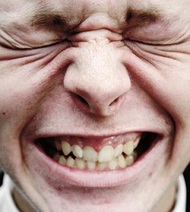 Oar, oar not jaw jaw! Oar, oar not jaw jaw! You're seconds away from achieving a personal best on your 2,000 meter time trial and it hurts. You don't want to slow down your stroke rate but your lungs and muscles are on fire. You plead with yourself, 'Keep going, keep going!", and try to convince your aching body that just a dozen or more strokes and you're home and dry (well not dry, probably quite sweaty). You glance at the display and the meters are ticking away to the magic 2,000 mark, and encouraged by the proximity of the finish line, you give it one more push (or pull really) to bring the pain to an end quicker. But what do you do when you're at this stage. If you're like 99.9% of everyone else in this situation, you're most likely pulling a face - a bit like this chap on the right. You grit your teeth and bare it - the pain that is. But does it help? Can clenching your jaw help to shut out the pain and allow you to pull harder to meet your target? Err... no it doesn't. In fact, it can make it tougher. Once you tighten your strong jaw muscles, you also stiffen your neck and shoulder muscles. This means you're using energy just to make a face which brings nothing to the stroke. AND.... all this unnecessary effort is like putting one foot on the brake while the other is on the gas - not too efficient eh! On the physical side of things, the tension in your face and neck prevents your head-righting and coordination reflexes working. Why does this matter? This means that your muscles will not be switching on and off when they should. So when you're pulling, you may find muscles that should be releasing may not be doing so at the right time. This is turn means you could be working against yourself - a sort of private tug-of-war. You may have heard the saying 'smile and the world becomes a better place'. Even if it's a false smile, the act of smiling can actually help you feel better. This is because of the muscles that form a smile feedback the memory of happier times so your brain can be fooled into thinking your happy. So if you start pulling a 'working hard' face you associate with all that effort, it will feel like hard work. There's no reason why we do pull faces when rowing hard and I believe it can become a habit. I'm not saying you should start smiling when you're closing in a personal best, but why not try to relax your face and see what a difference that could make. Check that you're not clenching your jaw and try to leave a gap between your upper and lower teeth. It can also help to not grip the handle too tight. There's a reflex (known as the Babkin reflex or response) that connects your hands to your jaw. It can be seen in babies feeding as they clench their fists, and also young children learning to write as they stick out their tongues - also seen occasionally in adults as they d something fiddly with their fingers such as threading a needle. If you soften your grip it can help relax your jaw and face and therefore free up unnecessary tension throughout your whole body. If it sounds nuts don't take my word for it - give it a go and let me know how it worked for you.
0 Comments
|
AuthorRoy Palmer is an athletics coach, teacher of The Alexander Technique and a rowing fanatic. Archives
August 2020
Categories
All
|
 RSS Feed
RSS Feed